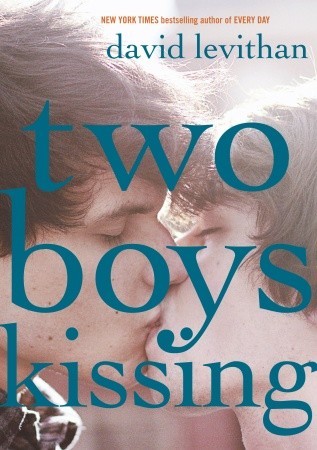Parent wishes to ban book

press release photo
April 9, 2014

After a group of students noticed the cover of David Levithan’s 2013 novel, Two Boys Kissing, parent Jessica Wilson launched a book challenge to remove it from FHS’s library. The complaint was officially filed on the grounds that the picture on the book’s cover, which features two boys kissing, violated the school’s policy of no public displays of affection. Furthermore, Wilson was concerned that the book had overt sexual content.
“My first thought was that I was shocked,” Wilson said. “My second thought was, ‘who purchased this book for the library and why?’ My issue is with the teenage celebration of sexuality throughout the book. At my home, we can talk about what [my children] are going to watch or read, but this book just kind of felt snuck in the library. It also made me wonder, budgetary-wise, if the school is spending money for the proper resources. I cannot imagine that there wasn’t another, more appropriate book that could have been purchased that would’ve appealed to a wider audience.”
In February, a committee comprised of librarian Becca Isaac, Principal Tripp Burton, English teacher Marie Miller, and senior Sierra Aceto assembled to discuss the book and determine whether or not it should be banned. The majority agreed that the book was age-appropriate and that it held literary merit because it was well-written, had a compelling plot and characters, and would stand up over time. Additionally, the book isn’t mandatory reading and appeals to a niche as an optional reading selection.
“While it isn’t a book I would’ve chosen for myself, I really enjoyed it,” Aceto said. “It’s very relevant to our society today.”
Isaac initially decided the book was suitable for the library based upon positive book reviews that were published in reputable trade journals. She referred to a review from Kirkus that stated that the book was, “well-intentioned and inspiring, but it doesn’t push any boundaries.”
“I think we all agreed that the book was within the library materials policy, and it met all the criteria,” Isaac said. “If you decide to take a book off library shelves just because one person complains, it sets a precedent. We’re trying to prevent censorship. The Bill of Rights talks about our rights of self-expression—that’s why we have these policies.”
Two Boys Kissing is based upon true events and pivots around 17-year-olds Harry and Craig who are attempting to set the Guinness World Record for longest kiss. The boys are motivated to set the record after one of their gay friends is brutally beaten because of his sexual orientation. Narrated by a Greek chorus of men who died of AIDS, the book explores the lives, relationships, and struggles of several other gay teenagers.
“I thought the book depicted the lives of gay teens realistically,” Miller said. “Some of the characters dealt with verbal and physical harassment from their classmates and community. Others were rejected by their parents. I thought that was the most heartbreaking part. Others found acceptance and support from family and friends. The book reaffirmed to me that all individuals deserve to find happiness, safety, and love and to be respected for their character, not defined by their gender orientation.”
Although the cover of the book does show two boys kissing, Aceto thought the image formed a weak basis to censor the book, and that the parent’s issue was more with the book’s subject matter than the cover itself.
“I think if you’re banning a book based on our PDA policy, then you’re going to be banning a lot of books,” Aceto said. “It’s literature, and ‘affection’ is a large part of it. I don’t see how two boys kissing is any different than if it were a boy and girl.”
Although the committee decided the book was acceptable, Wilson chose to appeal, rather than abide by the committee’s decision. Accordingly, associate superintendent Sandra Mitchell will appoint a committee that will include one teacher from FHS, two teachers from another school that teach the same grade level, one administrator, a parent, and one member from the business or professional community. Everyone on the committee will read and then discuss the book. During the process, the book will remain on library shelves. The meetings will begin on April 23 and the committee must come to a verdict regarding the book within six weeks. Following this stage, the complainant can appeal to the School Board. If the book is deemed inappropriate, it will be removed from the library.
While Wilson isn’t sure if she will choose to appeal again if the book is declared acceptable, she’s glad the book is getting public attention.
“The good thing about appealing is that it opens the matter up to public debate,” Wilson said. “It’s not like this isn’t a book that I wouldn’t let my kids read, but it’s the fact that it’s in a school. Books like The Scarlet Letter and One Flew Over the Cuckoo’s Nest don’t embrace sexuality. They have consequences, and it’s integral to the story. When you’re a teenager, it’s normal to question your sexuality, your faith, but the school isn’t your nanny; it isn’t up to the school to provide this guidance.”
Aceto believes the book’s significance supports retaining it in the library.
“The book’s subject matter is too important to today’s society to ban it from the library,” Aceto said. “The book’s cover represents so much more than just what it showed. There’s a lot of different stories in the book, and that one kiss represents all of their struggles.”
Sophomore Jacqueline Smith believes the book’s proposed banning is unjust.
“The banning of books invades not only our rights as Americans, but our rights as people in general,” Smith said. “I can understand removing books from school libraries because of pornographic content, but banning a book because it contains an idea or imagery you don’t agree with is just encroaching on somebody’s intellectual property. It’s sort of 1984-ish.”





